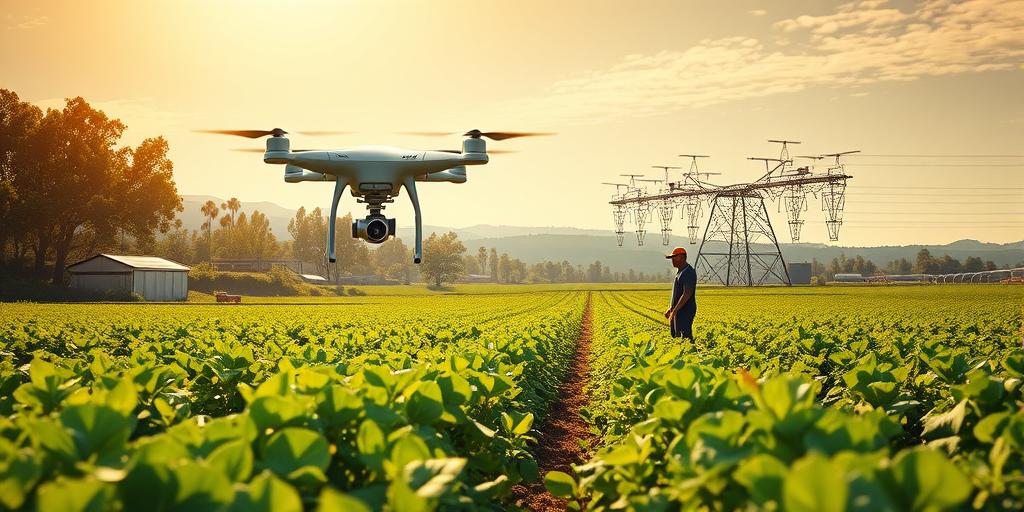Want to know how technology is revolutionizing farming? Prepare to be amazed! The Internet of Things (IoT) is no longer a futuristic concept; it’s actively transforming modern agriculture systems, boosting efficiency, and ensuring sustainable food production. From smart irrigation to precision livestock farming, IoT is changing the game, and in this article, we’ll explore exactly how.
Smart Irrigation: Optimizing Water Usage
Smart irrigation systems leverage IoT sensors to monitor soil moisture, temperature, and even weather patterns. This data-driven approach allows farmers to precisely control watering schedules, minimizing water waste and maximizing crop yields. Imagine a system that automatically adjusts watering based on real-time conditions – no more overwatering or underwatering! This not only conserves a precious resource but also contributes to sustainable farming practices. IoT sensors are the key here, providing vital information to optimize water management across entire fields, ensuring every plant receives just the right amount of hydration, reducing water bills, and maximizing profits.
Benefits of Smart Irrigation
- Reduced water consumption: Efficient irrigation means less water is wasted, making farming practices more sustainable.
- Improved crop yields: Precise watering leads to healthier plants, resulting in higher harvests.
- Cost savings: Reduced water bills and increased yields translate to significant savings.
- Increased efficiency: Automated systems free up farmers’ time to focus on other tasks.
Precision Livestock Farming: Monitoring Animal Health and Productivity
IoT sensors can also be used in livestock farming to monitor animal health, behavior, and productivity. Wearable sensors on animals provide real-time data on their vital signs, movement, and location. This data is analyzed to identify potential health issues early on, improving animal welfare and reducing losses due to illness or injury. This level of precision allows farmers to make data-backed decisions that improve herd health, reduce vet bills, and ultimately increase profits. The insights gained help optimize feeding regimens, predict health complications, and generally enhance productivity.
The Impact on Livestock Management
- Early disease detection: Sensors alert farmers to potential problems before they escalate, enabling timely intervention.
- Improved animal welfare: Monitoring vital signs ensures animals are healthy and comfortable.
- Enhanced productivity: Data-driven decisions optimize feeding and herd management, leading to higher yields.
- Reduced labor costs: Automated monitoring systems reduce the need for constant manual observation.
Crop Monitoring and Pest Management: A Smarter Approach
IoT devices such as drones and sensors equipped with cameras and other imaging technology are used for crop monitoring. Farmers can see where crops are struggling and where weeds are growing. This lets them use targeted sprays, which reduces the use of harmful pesticides and herbicides. This detailed monitoring enables proactive pest management, minimizing the environmental impact and improving yields. The data collected is analyzed to provide insights into the overall health of crops and predict potential threats.
Targeted Solutions for Optimal Growth
- Precision spraying: Precisely apply chemicals, reducing waste and protecting the environment.
- Early disease and pest detection: Identify issues early, enabling timely intervention and minimizing crop loss.
- Improved resource allocation: Optimize resource allocation by identifying areas requiring attention.
- Reduced chemical usage: Contribute to sustainable farming through reduced pesticide use.
The Future of IoT in Agriculture
The future of agriculture is undoubtedly intertwined with the continuous development and integration of IoT technologies. The potential benefits are vast, ranging from enhanced food security to more sustainable farming practices. As technology advances, we can expect even more sophisticated solutions to emerge, further optimizing agricultural operations and ensuring the long-term viability of food production. Imagine completely autonomous farms, managed by AI, capable of optimizing every aspect of the production cycle for maximal efficiency and minimal waste. That future is closer than you think!
Take control of your farm’s future. Implement IoT solutions today and experience the benefits firsthand. Don’t get left behind – join the agricultural revolution!




